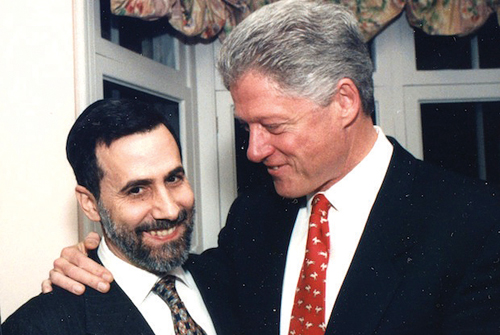.jpg)
When Rabbi Menachem Genack, CEO of the Orthodox Union’s kosher division, was asked to introduce former President Bill Clinton at a presidential fundraiser in 1992, he was unaware his words would have a profound impact on then-Governor Clinton. Rabbi Genack’s speech became the foundation for an ongoing and somewhat unconventional relationship between rabbi and president. They became pen pals, for all intents and purposes, and their friendship blossomed and remains steadfast to the present. Rabbi Genack’s book titled, Letters to President Clinton, is a compilation of the remarkable letters that Rabbi Genack and President Clinton shared throughout his presidency and thereafter.
At the fundraiser in 1992 Rabbi Genack quoted a verse from the book of Proverbs, “where there is no vision, the people perish.” The remark was made in reference to President George H.W. Bush’s (41) lack of vision for his presidential election. Clinton relished the remark and told Rabbi Genack that he would use it in his acceptance speech for the presidential nomination, and he did. Shortly after that, Rabbi Genack was invited to the White House and he brought along an essay, containing meaningful messages derived from the Bible’s ancient wisdom, which he thought Clinton would enjoy reading, and he did.
Shortly after Clinton won the election, invites to the White House came more frequently. Rabbi Genack says that Clinton has an “extraordinarily intellectual curiosity.” Each time Rabbi Genack was to go to the White House, he would prepare a brief essay containing insights from the Bible that he felt were correlated to current events or something insightful that he thought President Clinton would enjoy. Rabbi Genack’s essays, or missives as they called them, were not only welcomed but salient.
At one point, the Secret Service thought it unseemly for Rabbi Genack to be handing the president documents directly, so the president arranged for him to send the documents through his director of communication, Ann Lewis.
Clinton is “stunningly smart,” Rabbi Genack said. Rabbi Genack was often amazed by the amount of knowledge President Clinton had of the Bible as well as all types of books and works of literature. “All of which, he is able to quote by memory at any given moment,” Rabbi Genack said. Rabbi Genack refers to Clinton’s memory as “nothing short of remarkable.” Clinton was very receptive to Rabbi Genack’s missives, and he frequently sent handwritten, personal, thank you notes in return.
Rabbi Genack wrote a great deal about Israel, and the overpowering importance it has to the Jewish people. Rabbi Geanck also accompanied Clinton on many trips to Israel, “in Israel people connected with [Clinton] and greeted him with adulation,” says Rabbi Genack. When Rabbi Genack asked why, Clinton told him “They know that if Israel is in trouble, I would fight for Israel.” Rabbi Genack speaks about Clinton’s ardor for the late prime-minister Yitzchak Rabin, “Clinton still tears up when he speaks of Rabin.” Rabbi Genack ensured that Israel remained in the forefront of Clinton’s mind and that he understood that having the Jewish state of Israel is paramount to the Jewish people.
The missives became such a constant, that when President Clinton felt he hadn’t received one in a while he would ask Ann Lewis to reach out to Rabbi Genack and ask him to send another one. Rabbi Genack began asking friends and acquaintances, such as Bible scholars, political leaders, scientist, clergy members and laypeople, to write essays conveying messages found in the Bible that relate to the current times and policies.
“Clinton is truly interested in people,” says Rabbi Genack. He welcomed all the essays and found comfort and solace in many of them, especially during trying times.
The Monica Lewinsky scandal caused a lot angst for President Clinton during his presidency. Many of the missives that were sent hinted at the situation, but never outright mentioned it. Since the book is categorized by topic and not in chronological order, most of the letters about the Lewinsky scandal can be found in the Sins and Repentance chapter. A few of the letters in the book speak about the reason Judah became the acknowledged leader of the Tribes of Israel, when he was the brother to have not one, but two major transgressions. One sin was with the sale of Yosef to the Egyptians and the other sin was his illegitimate relations with his widowed daughter-in-law Tamar. In it a Norman Lamm, former chancellor of Yeshiva University, wrote “because Judah rises above his failures. He atones for his sins and goes on to greatness. He redeems himself.” In another missive, Rabbi Genack quotes Rabbi Joseph B. Soloveitchik who explains that “Judah is chosen for kingship because he is able to admit a mistake.” Humans make mistakes and missteps and to be a critical leader one must have “the capacity to admit a mistake and not be wedded to a misguided and possibly disastrous course,” Rabbi Genack wrote.
In his missive about Judah and Tamar, Rabbi Genack mistakenly cited a passage as being from Gen 28; however, President Clinton, in another testimony to his vast Biblical knowledge, tactfully corrected Rabbi Genack stating the citation is in actuality Gen:38. [Clinton’s response to Senator Joe Lieberman’s article, shows he was such a man.]
Luck brought these two history loving, brilliant, humanitarians together. But luck is only the moment when preparation meets opportunity. Imagine how many people Clinton met on his political road to presidency. They did not all leave a deep impression on Clinton, they were not all pen pals, and they were not all invited to the White House. Rabbi Genack and Clinton have a connection that began when Rabbi Genack prepared his introduced Bill Clinton and thoroughly impressed the president’s enormously inquisitive mind and appreciation for wisdom. One of Bill Clinton’s philosophies is “that truth cannot be monopolized by a single group, but is diffused through different traditions.” Their shared interest for history, spirituality, and belief in humanity has put them both in one of history’s spotlights.
By Kelitta Weber











